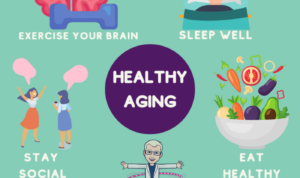Healthy Lifestyle Tips sets the stage for a journey towards wellness, highlighting the key aspects of nutrition, exercise, mental health, and stress management with a cool high school hip vibe. Get ready to unlock the secrets to a healthier you!
Let’s dive into the world of vibrant well-being and discover how simple lifestyle changes can make a huge impact on your overall health and happiness.
Importance of Healthy Lifestyle

Maintaining a healthy lifestyle is crucial for overall well-being. Not only does it improve physical health, but it also has a positive impact on mental and emotional health. By adopting healthy habits, individuals can enhance their quality of life and reduce the risk of various diseases.
Benefits of Maintaining a Healthy Lifestyle
- Regular exercise helps in maintaining a healthy weight and reduces the risk of chronic diseases such as heart disease, diabetes, and obesity.
- A balanced diet provides essential nutrients for the body, boosts immunity, and improves overall energy levels.
- Adequate sleep promotes cognitive function, mood regulation, and helps in overall mental well-being.
Impact on Overall Well-being
Adopting a healthy lifestyle can lead to increased longevity and a higher quality of life.
- Reduced stress levels and improved mental clarity contribute to better decision-making and productivity.
- Physical fitness enhances self-esteem and body image, leading to a positive outlook on life.
Examples of Healthy Habits
- Drinking plenty of water throughout the day to stay hydrated and promote optimal bodily functions.
- Incorporating fruits and vegetables into meals for a well-rounded and nutritious diet.
- Engaging in regular physical activity, whether through sports, workouts, or other forms of exercise.
Nutrition Tips: Healthy Lifestyle Tips

Eating a balanced diet is essential for maintaining a healthy lifestyle. It not only provides the necessary nutrients for our body to function properly but also helps prevent chronic diseases and promotes overall well-being.
Guidelines for Creating a Balanced Diet
- Include a variety of fruits and vegetables in your meals to ensure you get a wide range of vitamins and minerals.
- Incorporate whole grains like brown rice, quinoa, and whole wheat bread for fiber and sustained energy.
- Include lean protein sources such as chicken, fish, tofu, and legumes to support muscle growth and repair.
- Don’t forget healthy fats like avocados, nuts, and olive oil for brain health and hormone production.
- Avoid processed foods high in added sugars, sodium, and unhealthy fats as they can contribute to weight gain and chronic diseases.
Importance of Staying Hydrated and Consuming a Variety of Nutrients
Staying hydrated is crucial for maintaining proper bodily functions and overall health. Water helps transport nutrients, regulate body temperature, and flush out toxins. Aim to drink at least 8 glasses of water per day and more if you are physically active or live in a hot climate.
Consuming a variety of nutrients is important to ensure you get all the essential vitamins and minerals your body needs to thrive. Eating a rainbow of fruits and vegetables, whole grains, lean proteins, and healthy fats will help you achieve optimal health and wellness.
Examples of Nutrient-Dense Foods and Their Benefits
| Food | Benefits |
|---|---|
| Spinach | Rich in iron, vitamin A, and vitamin K for healthy blood and bones. |
| Salmon | High in omega-3 fatty acids for heart health and brain function. |
| Blueberries | Packed with antioxidants to boost immune function and protect against cell damage. |
| Quinoa | A complete protein source with all essential amino acids for muscle repair and growth. |
Exercise and Physical Activity
Regular exercise is a key component of a healthy lifestyle as it helps maintain overall physical and mental well-being. Engaging in physical activity can reduce the risk of chronic diseases, improve mood, boost energy levels, and enhance quality of life.
Types of Exercises for Various Fitness Levels
- Cardiovascular Exercises: Activities like running, cycling, or swimming that elevate the heart rate and improve cardiovascular health.
- Strength Training: Using weights or resistance bands to build muscle strength and increase metabolism.
- Flexibility Exercises: Stretching routines that improve range of motion and prevent injuries.
- Balance Exercises: Yoga or Tai Chi to enhance stability and reduce the risk of falls, especially for older adults.
Tips for Staying Motivated to Exercise Regularly, Healthy Lifestyle Tips
- Set Realistic Goals: Establish achievable milestones to track progress and stay motivated.
- Find Enjoyable Activities: Choose exercises that you genuinely enjoy to make working out more fun.
- Mix It Up: Incorporate a variety of exercises to prevent boredom and target different muscle groups.
- Recruit a Workout Buddy: Having a friend to exercise with can provide accountability and make workouts more social.
- Reward Yourself: Celebrate reaching fitness goals with non-food rewards to stay motivated and committed.
Mental Health and Stress Management
Taking care of your mental health is just as important as taking care of your physical health. The two are closely intertwined, and a healthy mind contributes significantly to overall well-being.
Strategies for Managing Stress Effectively
Stress is a common part of life, but it’s essential to find ways to manage it effectively to prevent it from taking a toll on your mental and physical health. Here are some strategies to help you cope with stress:
- Acknowledge and accept your feelings: It’s okay to feel stressed, but recognizing and accepting your emotions is the first step in managing them.
- Practice relaxation techniques: Deep breathing, meditation, or yoga can help calm your mind and reduce stress levels.
- Stay active: Regular physical activity can help reduce stress and improve your mood.
- Set boundaries: Learn to say no to things that cause you unnecessary stress and prioritize self-care.
- Seek support: Talking to friends, family, or a therapist can provide valuable support during stressful times.
Incorporating Mindfulness Practices into Daily Routines
Mindfulness involves being fully present in the moment and paying attention to your thoughts and feelings without judgment. Incorporating mindfulness practices into your daily routine can help reduce stress and improve your overall mental well-being. Here are some tips to help you incorporate mindfulness into your day:
- Start your day with a mindfulness practice: Take a few minutes in the morning to meditate, practice deep breathing, or simply focus on the present moment.
- Practice mindfulness during daily activities: Pay attention to your surroundings, sensations, and emotions while eating, walking, or doing household chores.
- Take breaks to breathe and refocus: When you feel overwhelmed, take a moment to pause, breathe deeply, and refocus your attention on the present.
- Practice gratitude: Take time each day to reflect on things you’re grateful for, which can help shift your focus to the positive aspects of life.


